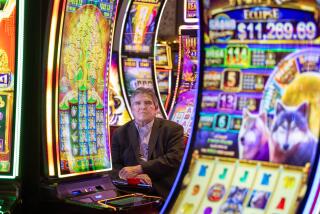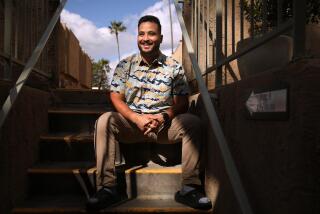River Boat Gamblers : San Diego Entrepreneur Wants to Try His Luck on Iowa Rivers
- Share via
Three years ago, 62-year-old San Diego entertainment entrepreneur Franklin Fried was looking for a new business to get into.
So, Fried brainstormed for a product that would satisfy Americans’ yearning to go back to a simpler time, for something with mystique that was romantic and perhaps a bit naughty, too.
Something like . . . river boat gambling.
Approached by Iowa officials eager to find new ways of boosting a state economy weakened by an agricultural recession, Fried offered to start an operation that would send paddle-wheel steamboats churning along the Mississippi and Missouri rivers that border the state.
Fried saw river boats stocked with tourists eager to try their hands at blackjack or roulette as potentially a unique and lucrative new tourist attraction. Each boat could generate $15 million to $17 million in annual revenues, a portion of which would flow into the state’s coffers.
On Tuesday, this scenario took one step closer to reality as Fried Schegan & Associates of San Diego was selected by the Missouri River Historical Development Inc. to operate Iowa’s first river boat gambling operation. The nonprofit organization is representing Sioux City and Woodbury County, both situated near the state’s western border.
Fried describes the river boat idea as “a small theme park on the river” combining reverence for history and an escape from modern-day complexity. “To that, we’re adding the intrigue of gambling--something slightly naughty that appeals to most everyone,” Fried said. “Combine those factors, and I think I have a chance to hit a home run.”
No one will be cheering harder for Fried than Iowa tourism officials.
Earlier in the decade, the Iowa economy was hit hard by the agricultural recession, said Dennis Guffey, deputy director of the Iowa Department of Economic Development, which oversees the state tourism industry. Subsequently, state officials have actively sought to diversify the state’s economy, emphasizing tourism.
According to Guffey, such efforts led to a record $2.1 billion in tourism dollars in 1988. Now, Iowa officials are betting on river boat gambling to add to their success.
“We’ve supported this from the very start and think it has the potential to become a huge industry for the state,” Guffey said. Tourism expenditures from river boat gambling could pump $50 million annually into Iowa’s economy and create jobs. In addition, the state expects to receive $5 million a year in taxes from gambling revenues.
“River boats can bring to life the rich lore of the Mississippi, the Mark Twain era,” Guffey said, and attract “people from across the nation.”
But not everybody in Iowa has been so receptive to the new venture.
Indeed, it has taken more than three years to persuade the Iowa legislature to approve a bill permitting gambling river boats to travel on the state’s waterways. And, until Republican Gov. Terry E. Branstad signed a bill into law on April 27, opponents, concerned that their state would become another Atlantic City or Las Vegas, vociferously objected to the proposal.
Opposition from groups such as the Iowa Alliance Against Riverboat Gambling fueled considerable political debate and apparently caused legislators to waffle on the issue. The House and Senate both rejected proposed river boat gambling legislation at least once during the past three years before finally passing a bill this spring.
Getting the law passed was a major accomplishment for Fried and his partner, John J. Schegan. But many obstacles remained in their path. The partnership had to wait for individual counties to approve river boat operations and then had to compete against a handful of other prospective operators to win individual contracts.
Besides serving Sioux City, the partnership hopes to win contracts to establish operations in Dubuque County and a region of Southeastern Iowa that includes the cities of Burlington, Ft. Madison and Keokuk. Winning contracts for those locations would allow Fried and Schegan to run river boats along the Mississippi.
The partnership still needs to receive a gambling license from the Iowa Racing and Gaming Commission, which is expected to issue such documents in March. The state legislation allows operations to begin in April 1991.
“The toughest thing to overcome was trying to introduce gambling, even on a limited basis, into a ‘pure’ state like Iowa,” said Schegan, who, with Fried, spent most of the last year crisscrossing the state to present their proposals before anybody was willing to listen.
“Iowans don’t like change,” Schegan said. “They wanted to know if we had honorable intentions and whether we would live up to them.”
And what did Schegan and Fried tell Iowans? “We are creating an entertainment entity that offers limited gambling, not a gambling entity that has little entertainment.” Schegan and Fried plan to offer hearty Midwestern meals from 100-year-old recipes, music from the era and live theater.
Indeed, the river boat gambling bill, which was passed with built-in restrictions, enforces the partnership’s promise. Gamblers, for example, will be permitted to wager no more than $5 a bet and can lose no more than $200 each trip. In addition, only 30% of the river boat can be used for gambling.
Other states, including Illinois, Wisconsin, Indiana, Ohio and Louisiana, are now considering river boat gambling legislation as well.
Thus far, Fried and Schegan have recruited 14 investors, including singer Harry Belafonte, to raise money for their venture. The partnership expects to complete a feasibility study, required by the racing and gaming commission, by the end of the month. Once a license is obtained, the partnership will be seeking additional investors.
Fried and Schegan plan to spend about $12 million per river boat and initially plan to build three vessels. Each of the vessels will be about 200-feet long, 60-feet wide, four stories high, and carry 750 to 1000 passengers. Each boat will employ 300 to 350 workers.
Although Franklin says he now knows plenty about river boats, he concedes that he never pictured himself as a gambling river boat operator.
Born in Chicago, Fried, began his career in the entertainment business when he became an unemployed welder.
“I was friends with the late Al Grossman (who later became manager of singers Bob Dylan and Peter, Paul and Mary) when he was first starting out in the entertainment business. I had just been laid off and he needed a gofer. I took the job.”
After gaining some experience, Fried launched Triangle Productions, a Chicago-based concert promotion firm that attracted big-name performers such as the Beatles and Frank Sinatra to Chicago’s stages. A decade ago, his first wife’s medical problems brought the couple to the West Coast and he moved to San Diego four years ago.
Fried was first introduced to a river boat when a business associate asked him in 1983 to join the board of the Delta Queen Steamboat Co., a New Orleans-based operator of two, overnight, luxury steamboats. Shortly afterward, Fried was asked to become president of the company.
And that’s when Fried fell in love with the river boat.
“You have to get hooked when the paddle wheels start turning . . . you feel like you’re going back to the turn of the century,” Fried said. “It’s a tremendous feeling. That’s the charm of river boats.”
At first, Boston-born Schegan, 31, knew little about river boats. But, upon arriving in New Orleans on a hitch-hiking trip across the United States at age 19, Schegan felt the river boat’s lure.
“I was intrigued by New Orleans, its rich history . . . and of course, its restaurants and bars,” said Schegan, who began working as a pot washer in a restaurant in the city’s French Quarter. “I wanted to become a great restaurateur.”
For the next several years, Schegan became involved in several successful restaurant enterprises. Then came the opportunity to work for the Delta Queen Steamboat Co. and to manage the Mississippi Queen. That’s where he also met Fried.
For a year, Schegan lived aboard the Mississippi Queen and traveled along the Mississippi
“I got to see all these old historical cities,” Schegan said. “You can imagine what kind of impression it left on a kid from Boston. It gave me a chance to find out how diversified America is and explore its past.
“I became a time traveler.” Schegan said.
More to Read
Inside the business of entertainment
The Wide Shot brings you news, analysis and insights on everything from streaming wars to production — and what it all means for the future.
You may occasionally receive promotional content from the Los Angeles Times.










